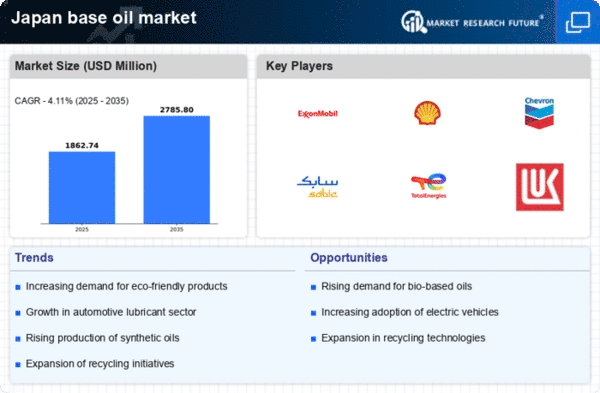The base oil market in Japan is characterized by a competitive landscape that is increasingly shaped by innovation, sustainability, and strategic partnerships. Key players such as ExxonMobil (US), Shell (GB), and TotalEnergies (FR) are actively pursuing strategies that emphasize technological advancements and environmental responsibility. ExxonMobil (US), for instance, has been focusing on enhancing its production capabilities through digital transformation initiatives, which aim to optimize operational efficiency and reduce carbon emissions. This strategic positioning not only strengthens its market presence but also aligns with the growing demand for sustainable products in the region.In terms of business tactics, companies are increasingly localizing manufacturing to better serve regional markets and optimize supply chains. The competitive structure of the market appears moderately fragmented, with several players vying for market share. However, the collective influence of major companies like Chevron (US) and SABIC (SA) suggests a trend towards consolidation, as these firms leverage their resources to enhance production capacities and expand their geographical reach.
In October Shell (GB) announced a significant investment in a new base oil production facility in Japan, aimed at increasing its output of high-performance lubricants. This move is strategically important as it not only enhances Shell's manufacturing capabilities but also positions the company to meet the rising demand for advanced lubricants in the automotive and industrial sectors. Such investments reflect a broader trend among competitors to bolster local production in response to market needs.
In September Chevron (US) launched a new line of eco-friendly base oils, which are derived from renewable sources. This initiative underscores Chevron's commitment to sustainability and innovation, catering to a growing consumer preference for environmentally friendly products. The introduction of these products is likely to enhance Chevron's competitive edge, as it aligns with The base oil market.
In August TotalEnergies (FR) entered into a strategic partnership with a local Japanese firm to co-develop advanced base oil technologies. This collaboration is indicative of a trend where international companies seek to leverage local expertise to enhance their product offerings. Such partnerships not only facilitate knowledge transfer but also enable companies to navigate regulatory landscapes more effectively, thereby strengthening their market position.
As of November the competitive trends in the base oil market are increasingly defined by digitalization, sustainability, and the integration of artificial intelligence in production processes. Strategic alliances are becoming pivotal in shaping the landscape, as companies recognize the need for collaboration to drive innovation. Looking ahead, competitive differentiation is likely to evolve from traditional price-based competition to a focus on technological advancements, sustainability, and supply chain reliability. This shift suggests that companies that prioritize innovation and environmental responsibility will be better positioned to thrive in the dynamic market.
















